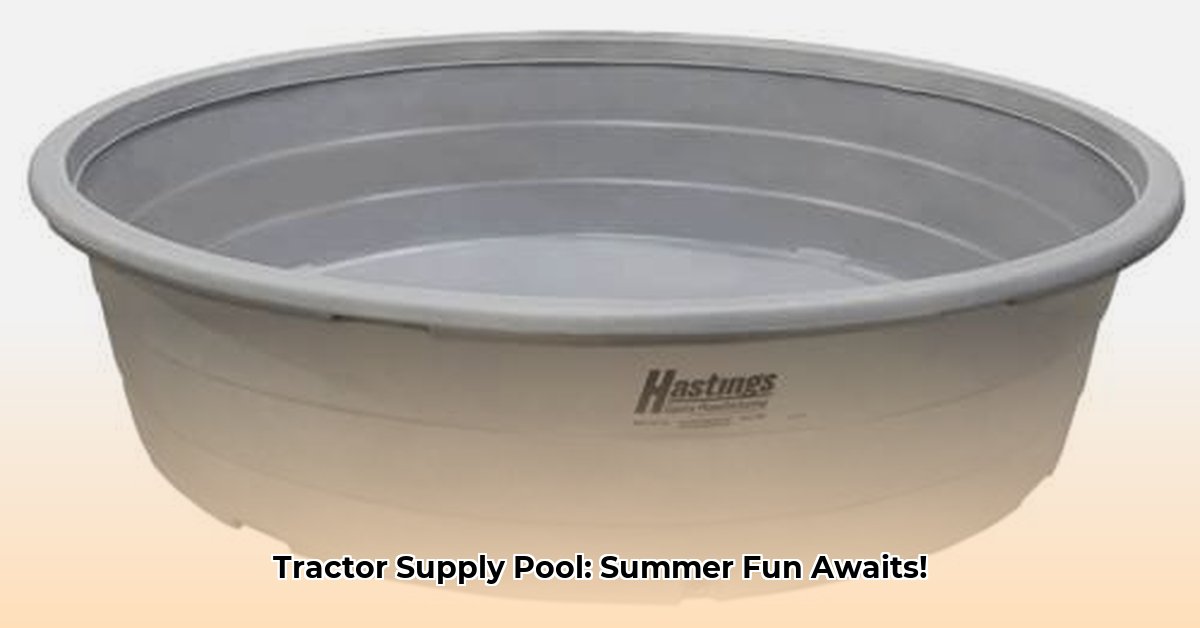
Making Summer Fun Environmentally Responsible: A Guide to Sustainable Pool Ownership
Summer is here, and the desire for a refreshing dip in a pool is strong. A Tractor Supply plastic pool might seem like a convenient and affordable option, but is it the most sustainable choice? This article explores how to enjoy summer fun while minimizing the environmental impact of pool ownership, focusing on water conservation and responsible material choices. We'll examine the lifecycle of a plastic pool, from its creation to its eventual disposal, considering water usage, chemical impact, and responsible end-of-life management. For more on Tractor Supply products, check out this resource.
Choosing the Right Pool: Material Matters
The biggest environmental factor is the pool's material. Is it made from recycled plastics, reducing landfill waste and demand for virgin materials? Or does it rely on newly produced plastic, increasing the overall plastic waste? The manufacturing process also affects the carbon footprint; a process using renewable energy is more sustainable. Unfortunately, lacking detailed information directly from Tractor Supply regarding the specific composition and manufacturing of their pools limits a definitive assessment. Detailed product specifications are crucial for informed consumer decisions. Can we expect transparency from manufacturers like Tractor Supply on the sourcing and production process of their products?
Water Conservation: Minimizing Water Usage
Regardless of the pool's material, responsible water usage is crucial, especially given water scarcity concerns in agricultural areas. Filling a large pool requires considerable water. How can we minimize water consumption during both initial filling and throughout its use? Simple steps like using a pool cover to reduce evaporation are essential. Regularly checking for leaks is another crucial step in responsible pool ownership. What strategies can be implemented to reduce the reliance on constantly refilling the pool?
Eco-Friendly Cleaning: Reducing Chemical Impact
Keeping the pool clean shouldn't involve harsh chemicals. These pollutants can harm the environment and contaminate waterways. Are there gentler, biodegradable cleaning options available? Could a robotic pool cleaner reduce the need for frequent chemical treatments? Exploring these eco-friendly alternatives can greatly decrease the pool's environmental impact. What innovative natural filtration systems might minimize chemical usage entirely?
Responsible Disposal: Avoiding Landfill Contributions
The pool's end-of-life is as important as its initial purchase. Improper disposal contributes to landfill overflow and environmental pollution. Before discarding it, check local waste management guidelines for proper disposal or recycling options. Some plastic types may be recyclable. What are some innovative ways to repurpose or recycle used plastic pools to minimize waste?
Beyond the Plastic Pool: Exploring Alternatives
For those deeply committed to environmentally conscious choices, a plastic pool might not be the best option. Consider alternatives like above-ground pools made from recycled materials or more sustainable in-ground pools. Even a smaller, simpler inflatable pool might suffice, reducing water and plastic use. What other sustainable recreational water options are available for rural communities?
Key Takeaways: Sustainable Pool Ownership
Choosing a pool requires careful consideration of its environmental footprint. While specific details about Tractor Supply's pool sustainability are limited, adopting responsible water use, eco-friendly cleaning, and appropriate disposal practices is crucial. Our responsibility extends beyond the product purchase; it encompasses mindful environmental stewardship. What steps can be taken to drive greater transparency and sustainability in the plastic pool market?